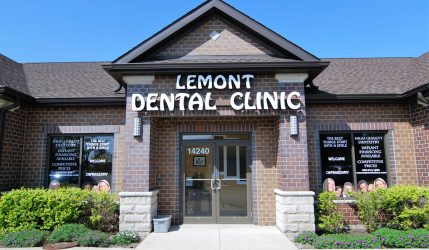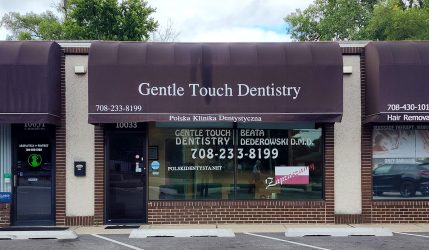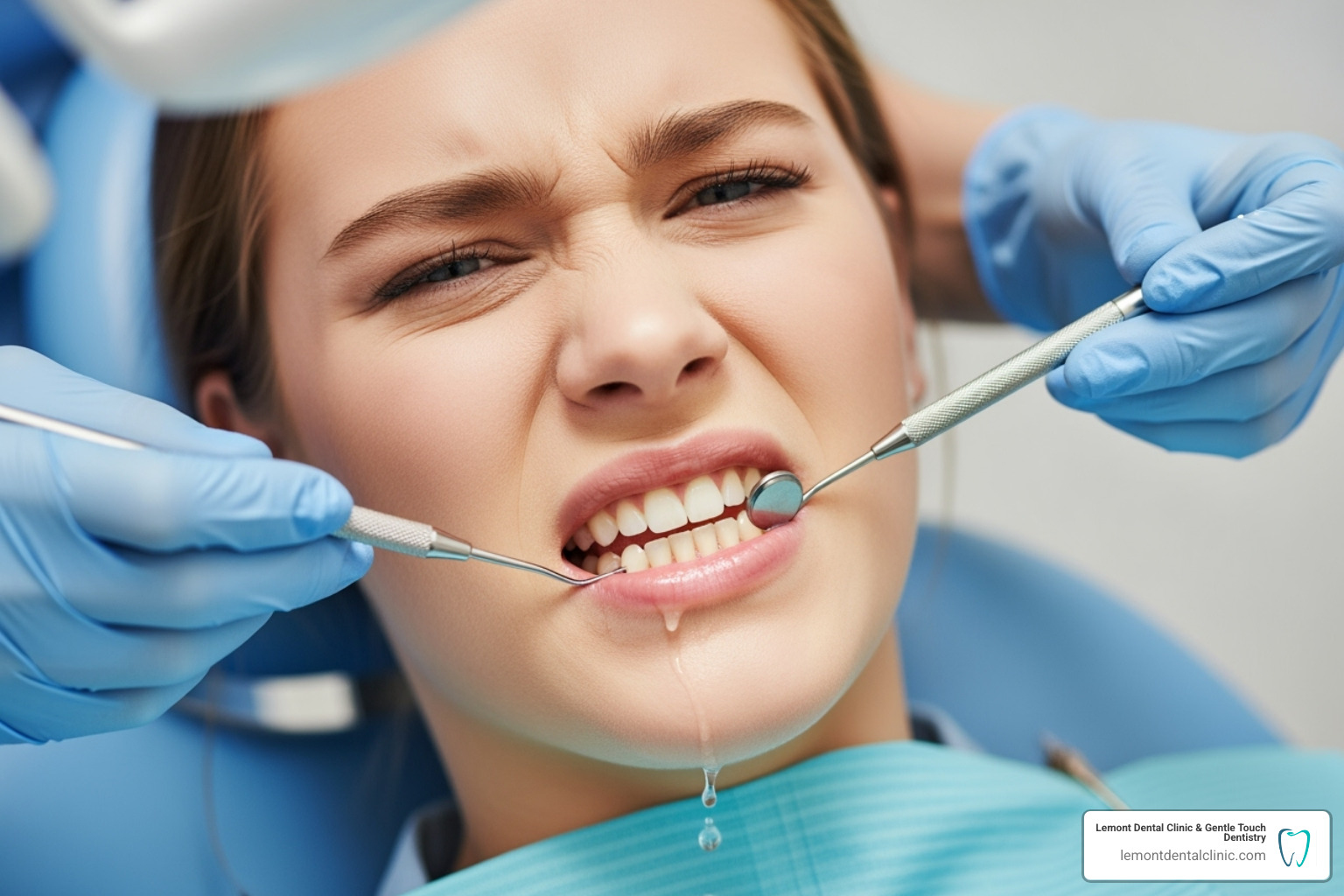Your Guide to Understanding and Preventing Dental Cleaning Pain
Why does dental cleaning hurt so much is a question many patients ask. The truth is, dental cleanings shouldn’t be painful when your mouth is healthy. However, several common issues can turn a routine visit into an uncomfortable experience.
Quick Answer: Why Dental Cleanings Hurt
- Gum disease and inflammation – Infected, swollen gums are tender and bleed easily.
- Heavy tartar buildup – Hardened plaque requires more pressure to remove.
- Exposed tooth roots – Gum recession leaves sensitive areas vulnerable.
- Tooth sensitivity – Worn enamel exposes nerve-rich dentin underneath.
- Dental anxiety – Stress and tension amplify pain perception.
The good news is that most cleaning pain is preventable. Understanding the causes of discomfort allows you to take steps toward a more comfortable visit.
With about half of Americans aged 30 and older having some form of gum disease, it’s no wonder many people experience pain during a routine procedure. Poor oral hygiene leads to plaque and tartar buildup, creating the perfect storm for a painful cleaning.
I’m Piotr Dederowski from Lemont Dental Clinic & Gentle Touch Dentistry. I’ve helped countless patients overcome their fear of dental cleanings by addressing the root causes of why does dental cleaning hurt so much. Through education and preventive care, we can make your cleaning experience comfortable.
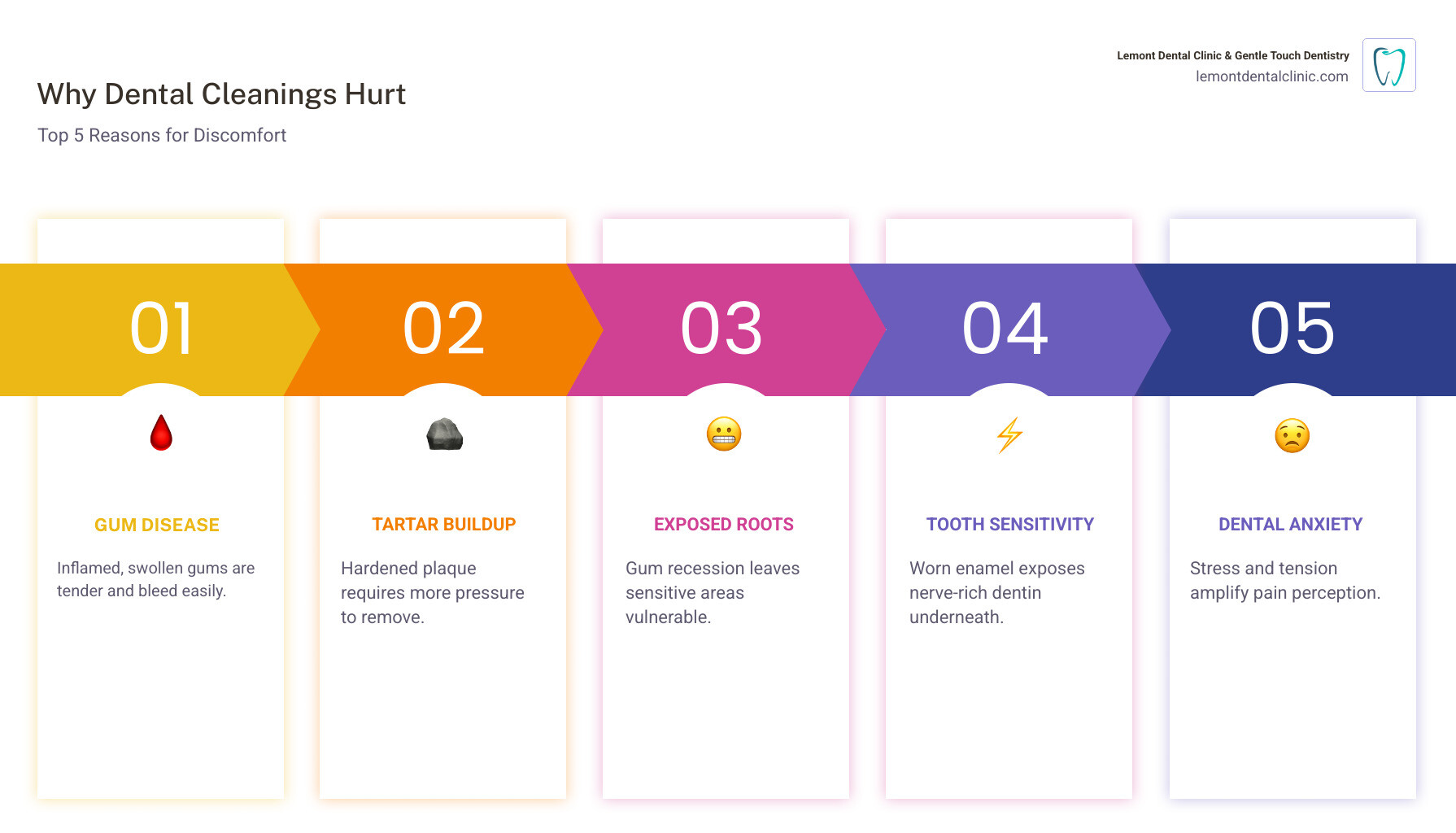
Why Does Dental Cleaning Hurt So Much? The Main Culprits
Let’s be honest – nobody looks forward to that scraping sensation during a dental cleaning. But here’s the thing: why does dental cleaning hurt so much isn’t really about the cleaning itself. It’s usually your mouth telling you a story about what’s been happening between visits. Think of cleaning pain as your mouth’s way of waving a red flag. When everything’s healthy, a cleaning should feel more like a thorough car wash than a construction project. The discomfort you’re experiencing points to underlying issues that need attention.
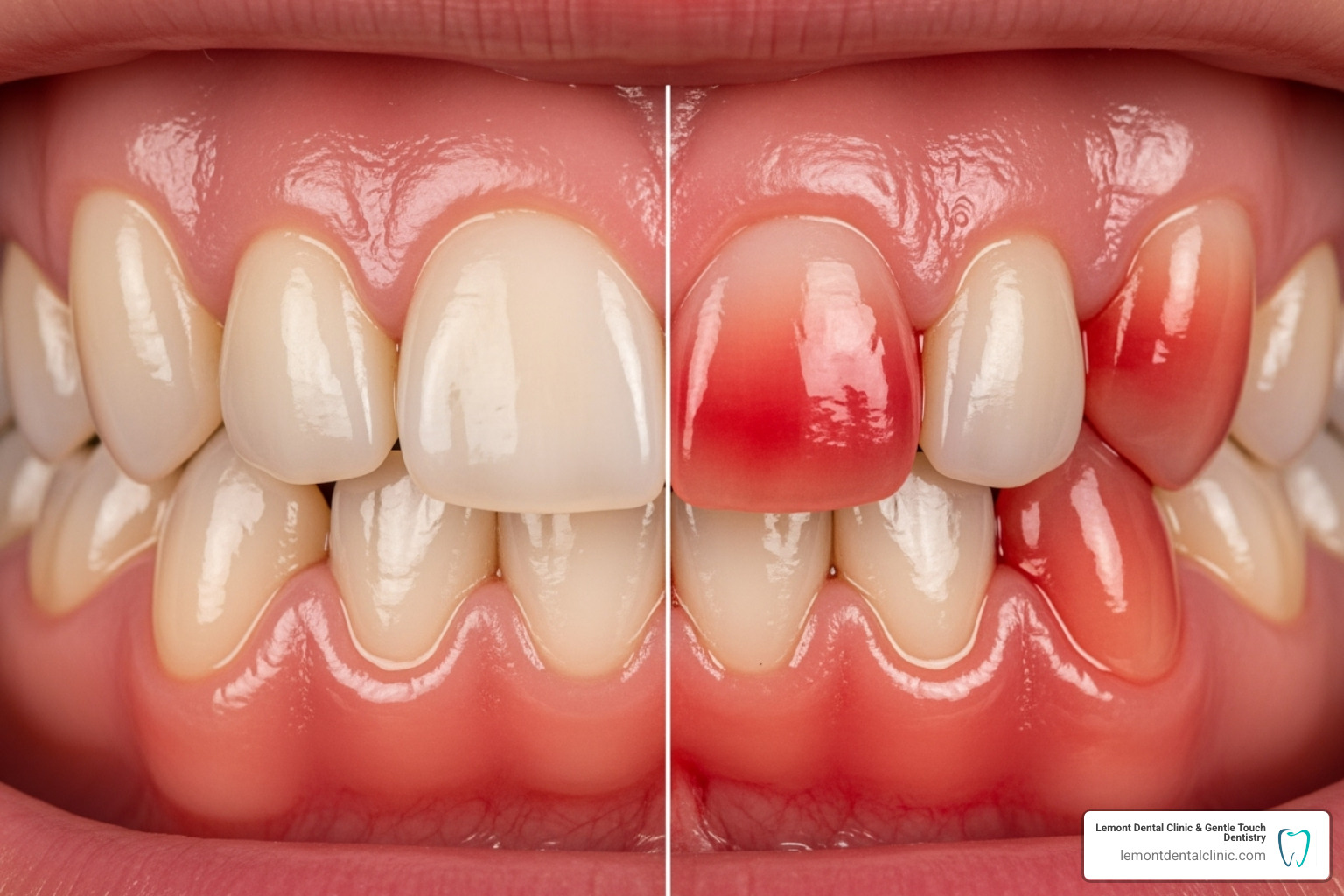
Inflamed Gums and Gum Disease
According to the American Academy of Periodontology, about half of Americans have some form of gum disease. If your cleaning is painful, inflamed gums are a likely culprit. With gingivitis (early stage) or periodontitis (serious version), your gums become swollen, tender, and bleed easily. Imagine someone touching a sunburn—that’s what it feels like when we clean around inflamed gum tissue. During a cleaning, our instruments are much more noticeable on these sensitive tissues. The good news is that once we control the inflammation, your next cleaning will be far more comfortable. For advanced issues, we may recommend a deep cleaning to restore gum health.
The Problem with Heavy Tartar Buildup
That sticky film on your teeth is plaque. If not removed daily, it hardens into tartar (calculus), which is like concrete for your teeth. Removing tartar, especially below the gumline, requires the hygienist to apply more pressure with scaling instruments. The more buildup, the more scraping is needed. With over 3.5 billion people suffering from oral diseases worldwide, this is a common struggle. Removing this bacterial concrete is essential for preventing bigger problems.
Exposed Roots and Tooth Sensitivity
Ever feel a zinging sensation during a cleaning? Exposed roots and tooth sensitivity are often to blame. Your tooth’s crown is protected by hard enamel. Below the gumline, the root surface is softer and full of tiny tubes leading to the nerve endings. When gum recession exposes this area, our instruments can stimulate these nerves, causing sharp, immediate signals. Sometimes, tartar acts as an insulator. When we remove it, these areas are suddenly exposed to temperature and air, causing temporary sensitivity that can make the cleaning itself uncomfortable. If you’re curious about other tooth sensations, check out our guide on what does a cavity feel like?
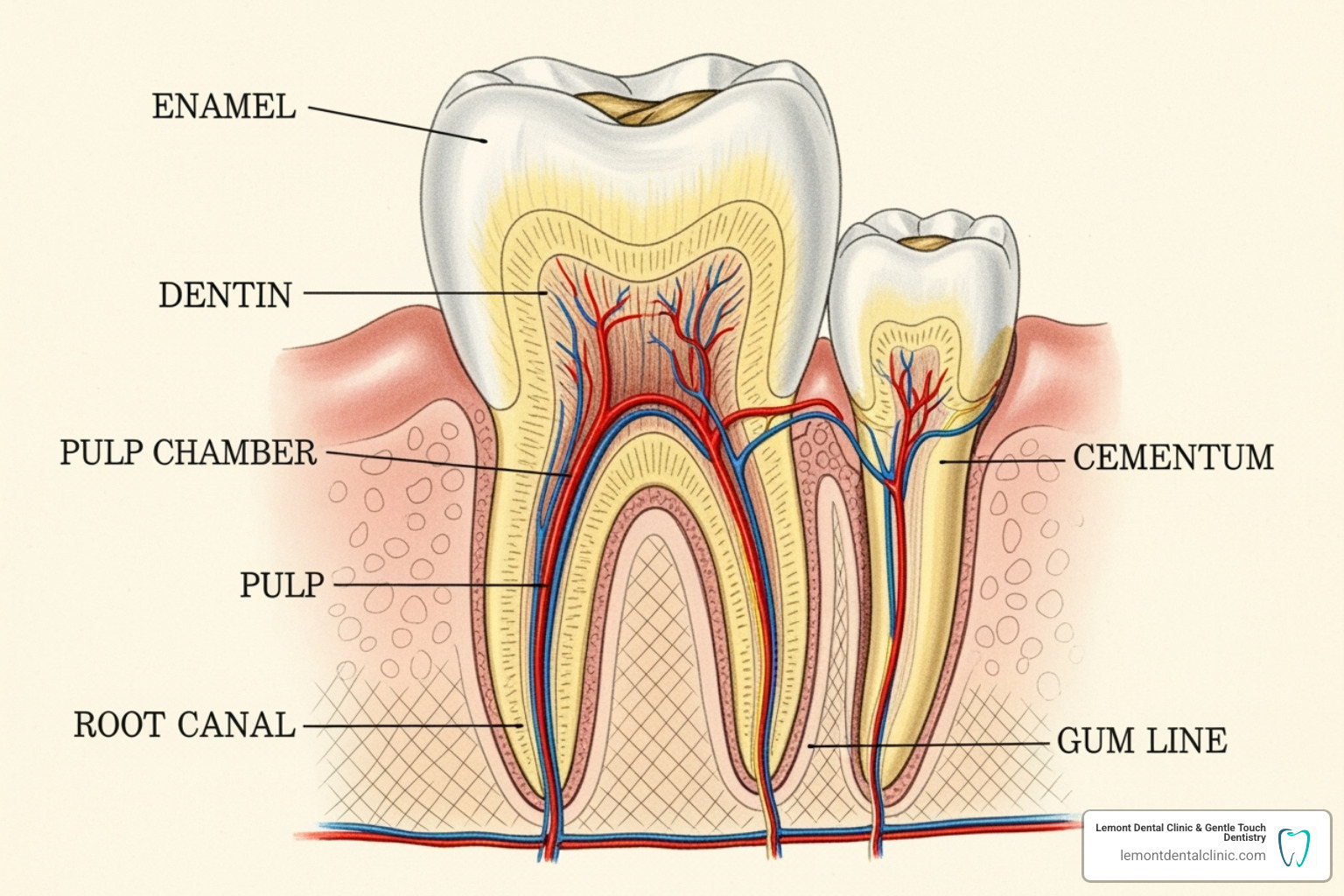
The Mind-Mouth Connection: Dental Anxiety
Dental anxiety can make everything hurt more. When you’re tense and fearful, your body clenches, and your pain perception heightens. What feels like mild pressure to a relaxed patient can feel like major discomfort to someone who is anxious. This creates a cycle: anxiety about pain makes you tense, which makes things feel worse, increasing anxiety for the next visit. Communication is your superpower here. Tell us you’re nervous. We can adjust our approach, offer breaks, and use techniques to help you relax. Your comfort matters, and there’s no shame in needing a gentler approach.
The Cleaning Process and Post-Cleaning Sensitivity
Now that we’ve explored the main reasons why does dental cleaning hurt so much, let’s walk through what actually happens during your cleaning and why your teeth might feel touchy afterward. Understanding the process can help you feel more prepared and less anxious.
Your cleaning is a carefully orchestrated process. Your hygienist begins with an examination to map out a custom cleaning strategy.
The main event is scaling, where we remove plaque and tartar. We use precise hand instruments called dental scalers and, for tougher buildup, an ultrasonic cleaner. This tool uses high-frequency vibrations and a water stream to break apart tartar. While effective, these vibrations can feel intense on sensitive teeth or exposed roots, which is one reason why does dental cleaning hurt so much for some.
After scaling, we polish your teeth with a rotating brush and gritty paste to smooth surfaces and remove stains. Finally, we floss between every tooth and may apply a fluoride treatment. The entire process requires precision and some pressure to be effective, which contributes to the sensations you feel. You can learn more about all our comprehensive dental services at Our Services.
Why Teeth Can Feel Sensitive After a Cleaning
Post-cleaning sensitivity is very common. When we remove tartar, we uncover newly exposed surfaces. Tartar acts as a harmful, unwanted blanket, but it also insulates the tooth. Once it’s gone, the underlying surface is exposed to temperature changes and air it hasn’t felt in a while.
This is especially true if you have exposed dentin, which contains microscopic dentin tubules leading to the tooth’s nerve. When these are uncovered, even cool air can trigger sensitivity. Your gums also need time to heal, especially if they were inflamed, which can cause temporary soreness. The temporary sensitivity that follows tartar removal is your mouth adjusting to its new, cleaner state. This sensitivity typically fades within a few days to a week. If you’re dealing with lingering discomfort, our guide on Teeth Sensitive After Cleaning – What Now? offers helpful solutions.
Your Action Plan for a More Comfortable Cleaning
The truth is, you hold the key to a more pleasant dental cleaning. When patients ask me “why does dental cleaning hurt so much”, I tell them that much of the discomfort is preventable. By taking proactive steps, you can make your next visit at Lemont Dental Clinic & Gentle Touch Dentistry significantly more comfortable.
The Power of At-Home Oral Hygiene
The best way to reduce cleaning pain starts in your bathroom. A healthy mouth means less work for us.
- Proper brushing technique: Use a soft-bristled toothbrush and gentle, circular motions twice a day for two minutes. Aggressive scrubbing causes gum recession and sensitivity.
- Daily flossing: This is your secret weapon against tartar buildup between teeth. If your gums bleed, don’t stop; it’s a sign of inflammation that will improve with consistent, gentle flossing.
- Antimicrobial mouthwash: This helps reduce bacteria that cause gum inflammation. Less plaque at home means less scraping pressure during your cleaning.
Why Regular Dental Visits are Crucial
Think of dental cleanings like housekeeping: regular dusting is easy, but waiting months requires a deep clean.
- Preventative care: Regular visits allow us to remove plaque before it hardens into stubborn tartar, making the process gentler.
- Early detection: We can spot early signs of gingivitis or sensitivity before they become major sources of discomfort.
Less intensive cleanings equal less discomfort. Patients who skip appointments often face a more uncomfortable visit due to accumulated buildup. Schedule your next Check-up to stay ahead. You might also enjoy our article on Food Festivals & Teeth Cleaning Near Me.
How to Minimize Discomfort During Your Appointment
Even with great home care, some sensitivity is normal. Here’s how we can work together for your comfort:
- Communicate with your hygienist: Don’t suffer in silence! Tell us if you feel discomfort or anxiety. We are on the same team.
- Ask for breaks: Simply raise your hand if you need a moment. Short pauses make a big difference.
- Request numbing gel: We can apply a topical anesthetic to sensitive gums, which can dramatically reduce discomfort.
- Use desensitizing toothpaste: Using this for a few weeks before your appointment can block pain signals in your teeth.
- Consider pain medication: Taking an over-the-counter pain reliever like ibuprofen about an hour before your appointment can help. Check with us first to ensure this is right for you.
At Lemont Dental Clinic & Gentle Touch Dentistry, we believe understanding why does dental cleaning hurt so much empowers you to work with us toward pain-free visits.
Soothing Your Smile: Post-Cleaning Care Tips
You’ve made it through your dental cleaning! But now you might be wondering why does dental cleaning hurt so much even after you’ve left our office. This is normal, and your mouth just needs a little TLC as it adjusts.
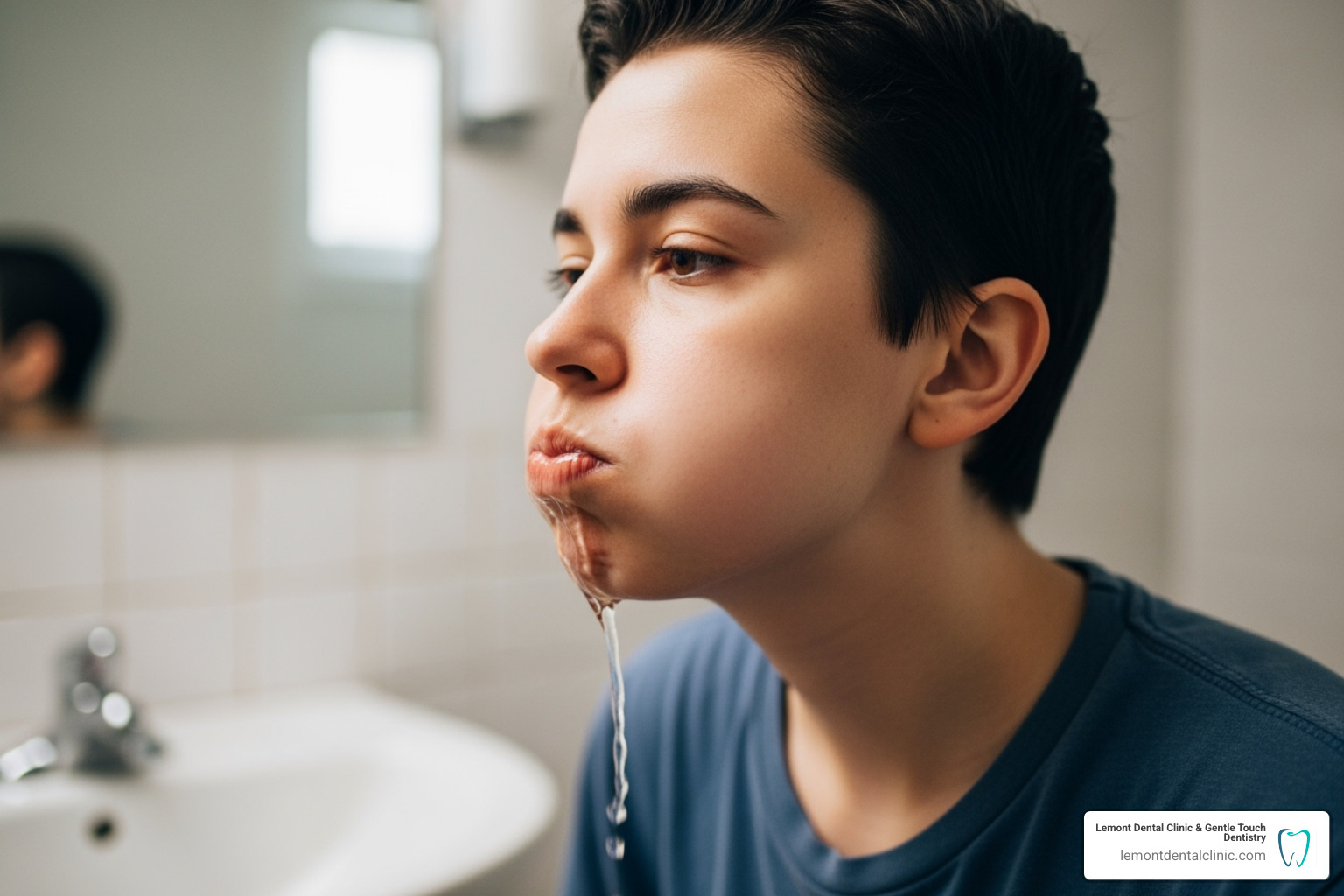
For the first 24-48 hours, your mouth needs recovery time.
- Warm salt water rinses: Dissolve half a teaspoon of salt in warm water and swish several times a day. This reduces inflammation and promotes healing.
- Avoid extreme temperatures: Stick to lukewarm foods and drinks for a day or two to avoid sharp sensitivity.
- Eat soft foods: Choose items like yogurt, mashed potatoes, and scrambled eggs to give your mouth a break.
- Use over-the-counter pain relievers: Ibuprofen or acetaminophen can be effective for significant discomfort. Ibuprofen is especially helpful as it also reduces inflammation.
- Brush and floss gently: Continue your oral hygiene routine, but use lighter pressure around tender areas for a few days.
Why does dental cleaning hurt so much even days later?
Lingering sensitivity is normal and a sign of healing. If you had significant tartar or gum disease, your gum tissues are adjusting. They need time to heal, reduce swelling, and re-tighten around your teeth. This process can cause some temporary tenderness. For most patients, any sensitivity resolves within 5 to 7 days. The duration depends on the amount of buildup removed and the initial health of your gums. This temporary discomfort means your mouth is getting healthier, setting you up for more comfortable cleanings in the future.
Frequently Asked Questions about Painful Cleanings
We understand you might have more questions about discomfort during or after dental cleanings. Here are some common concerns we hear at Lemont Dental Clinic & Gentle Touch Dentistry.
How long should pain or sensitivity last after a dental cleaning?
For most people, any discomfort from a routine cleaning fades within a few days to a week. If you had significant tartar buildup or a deep cleaning, sensitivity might last slightly longer as your gums heal. The duration depends on your initial oral health and the amount of buildup removed. It’s normal for some people to feel fine the next day, while others need a full week.
When should I be concerned about pain after a dental cleaning?
While temporary discomfort is expected, call our office if you experience persistent or severe pain that worsens or doesn’t improve after a few days. Signs of infection require immediate attention, including:
- Red, swollen, hot gums
- Pus discharge
- Persistent bad breath
- Fever
Other warning signs are significant swelling or heavy, persistent bleeding after the first day. When in doubt, please call us. You can learn more about dental pain in our guide on Why does my tooth hurt?.
Can I ask my hygienist to be more gentle?
Absolutely! We encourage you to speak up. Your comfort is our priority, and there’s no need to suffer in silence. Simply letting your hygienist know you’re uncomfortable allows them to help. They can adjust their technique, take breaks, or apply numbing gel to sensitive areas. Open communication is the first step toward a more pleasant experience and finding a solution to why does dental cleaning hurt so much.
A Pain-Free Cleaning is Possible

After exploring why does dental cleaning hurt so much, remember this: pain during a cleaning isn’t normal. It’s a sign from your mouth about underlying issues like inflamed gums or tartar buildup. The discomfort comes from addressing these problems, not the cleaning itself. When we remove months of buildup, your gums might feel tender as they heal, similar to sore muscles after a workout.
Your Partner in Comfortable Dental Care
At Lemont Dental Clinic & Gentle Touch Dentistry, our approach is prevention through education. We partner with you to make cleanings comfortable. Excellent home care—consistent brushing, daily flossing, and regular visits—means less tartar, healthier gums, and a gentler experience.
Our experienced doctors use the latest technology to ensure your comfort and address problems before they become painful. We help you build habits for easier future visits. By addressing issues like gum disease and tartar buildup with consistent care, you can achieve a comfortable, positive cleaning experience.
Ready to take the first step toward healthier gums and comfortable appointments? Learn more about what to expect during a Regular Cleaning and find how we can help you achieve the pain-free dental experience you deserve.
